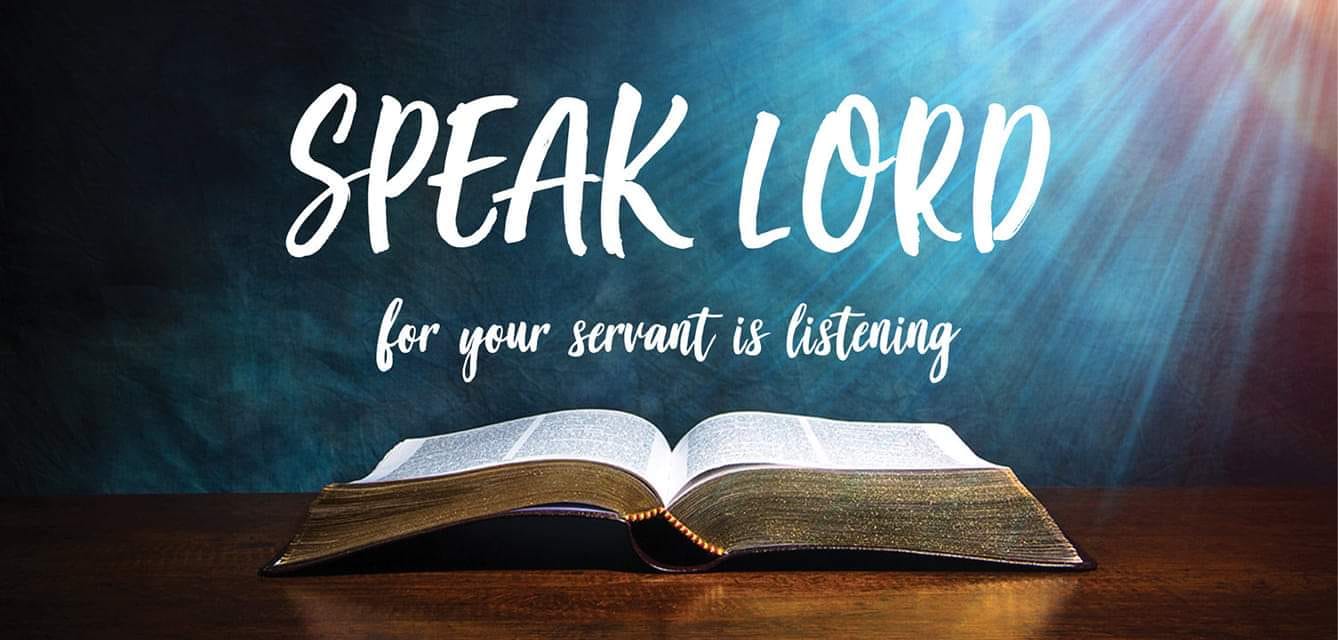Second Sunday of the year January 14, 2024
1 Samuel 3:3-10, 19; 1 Corinthians 6:13-15, 17-20; John
1:35-42
Waiting in a steamship office to be interviewed for the job
of a wireless operator, a group of applicants filled the room with such a buzz
of conversation that they were oblivious to the dots and dashes that began
coming over the loudspeaker. About that time another man entered and sat down
quietly by himself. Suddenly he snapped to attention, walked into the private
office, and a few minutes later came out smiling with the new job. “Say,” one
of the group called out, “how did you get in ahead of us? We were here first.”
“One of you would have gotten the job,” the successful applicant replied, “if
you had listened to the message from the loudspeaker.” “What message?” they asked.
Do we listen to God?
Today's First Reading and Gospel relate a call in life explicitly
to God. We notice how prompt was Samuel to go to Eli and ask him if he called
him. But in daily life it is not always simple to find out what one's call is.
God works implicitly through our inclinations, natural abilities, friends,
parents, educators, and church affiliation. These will guide us in deciding how
we are going to make a living and, as a rule, in choosing a partner for life.
We are in a busy world. Perhaps we don’t realize enough how
hard it is to listen to one another. We are so busy with ourselves and with our
affairs that we don’t hear others or listen to them. How much harder it is for
us to hear God and to listen to him! He loves us; he speaks to us, mainly
through his written word in the scriptures, in the voice of the Church, in his
commandments, in other people, especially in prophets and the poor, in the
events of life. Pay attention, try to hear him and say like Samuel: “Speak,
Lord, your servant listens.”
God’s call is a gift and this call is given to each and
every person demands a response and readiness to work for him. He has called
people to be missionaries, preachers, teachers, ordinary office workers,
builders of families, social workers, medical practitioners, nurses, persons
who could be his instruments of reconciliation, to work as priests and
religious. In the Old Testament Prophet Jeremiah responding to the call of God
says how he was called by God and he felt cheated at times and did not want to
talk any more, for as a prophet he had suffered a lot from his adversaries. God wants each and every one of us to
experience the Kingdom of God through the Person of Christ. He is concerned of
the new hearts and human spirits he has created within us.
The Gospel passage begins with John the Baptist pointing to
Jesus and declaring, "Behold, the Lamb of God!" (John 1:36). This
proclamation is not merely an introduction; it is an invitation to recognize
Jesus as the Messiah, the one who will take away the sins of the world. In our
lives, how often do we take the time to behold the Lamb of God amid the
busyness and distractions that surround us?
Andrew and his companion respond to John's call by following
Jesus. The Lord turns and asks them, "What are you looking for?"
(John 1:38). This question resonates through the ages and speaks directly to
our hearts. What are we seeking in our lives? What is the deep longing within
us that only Christ can fulfil? In the hustle and bustle of our daily routines,
it is essential to pause and reflect on the true purpose of our existence.
Andrew's response is simple yet profound: "Rabbi (which
means Teacher), where are you staying?" (John 1:38). Andrew seeks not only
to follow Jesus but to dwell with Him. This invitation to abide with the
Teacher is an invitation to intimacy, to a personal relationship with Christ.
It challenges us to move beyond a superficial acknowledgment of Jesus and
instead to enter into a deep, abiding connection with Him through prayer,
Scripture, and the sacraments.
Jesus welcomes Andrew and his companion, and they spend the
day with Him. This encounter marks the beginning of a transformative journey
for Andrew. After spending time with Jesus, Andrew is filled with an
overwhelming desire to share the good news with his brother Simon. He exclaims,
"We have found the Messiah!" (John 1:41). Our encounter with Christ
should likewise compel us to share the joy of the Gospel with others. The call
to discipleship is inseparable from the call to evangelize and bring others to
Christ.
In our world today, marked by uncertainty, division, and
challenges, the call to discipleship remains as relevant as ever. As we reflect
on the example of Andrew and his companion, let us ask ourselves: Are we
actively seeking Christ in our lives? Do we respond to His invitation to abide
with Him in prayer and worship? And are we compelled, like Andrew, to share the
transformative love of Christ with those around us?
May this Sunday of the Year be a time of renewed commitment
to discipleship, a time when we respond wholeheartedly to Jesus' invitation to
"Come and see" (John 1:39). As we journey together, let us bear
witness to the transformative power of encountering the Lamb of God, who calls
us to follow Him and invites us into a deep and abiding relationship that
brings light to the darkness and hope to the world. May we remain alert and respond
at all times, “Speak, Lord, your servant listens.”
Happy Sunday


No comments:
Post a Comment